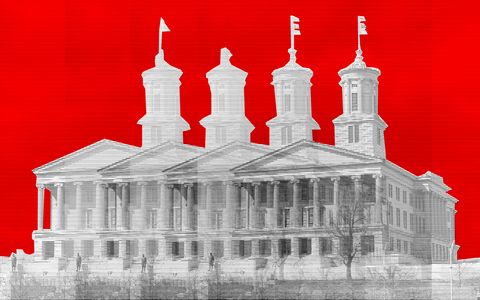TENNESSEE BILL COULD MAKE SLEEPING VIRTUALLY ANYHWERE WHILE HOUSELESS A CRIME
April 12, 2022 by CARTER HUESTIS
Share this article:

Tennessee is part of a wave of Southern states passing draconian bills aimed at punishing people for existing and restricting their control over their own bodies. From Arizona’s abortion and trans healthcare bans to Florida’s “Don’t Say Gay” bill there is seemingly no end to this wave of repression. The newest addition is Tennessee’s SB1610, a bill that makes it a felony to sleep virtually anywhere in the state that is not a private residence or a shelter for the houseless.
The newest amendment to the legislation started out as a reaction to the People’s Plaza Occupation during the George Floyd uprising, but has since taken on an anti-houseless slant with its reintroduction.
The history of the bill begins in 2012 with the Equal Access to Property Act, which criminalized camping on state property. LCRW talked to veterans of the Occupy Nashville movement and they claim that not only is the newest amendment to the bill a reaction to movements like Occupy but that it was even the intent all along.
“It’s sick to me that the Tennessee legislatures would make a target of political groups and then allow that to also affect people experiencing houselessness in incredibly terrible ways,” Lindsey Krinks, a former Occupy activist and co-founder of Open Table Nashville told LCRW.
In detail, S16B10 would make it a felony to camp without a permit on any public property as well as a Class C misdemeanor offense for solicitation or camping on the shoulder or right-of-way of state or interstate highways, or under a bridge or overpass. Public property includes things like sidewalks, streets, underpasses, and parks. This would affect established communities like the Jefferson Street Bridge encampment in Nashville and Brookmeade Park. Effectively, if this bill passes and is not struck down then it will be a felony to sleep anywhere that is not a house, an apartment or a shelter. Class E felonies in Tennessee carry a 1-6 year sentence and up to $3000 fines, not to mention depriving those convicted of voting rights and, ironically, making it harder to find a job and housing. An estimated 20 thousand people in Nashville who currently live without homes and many more around the state may soon become felons overnight.
At the April 6th Senate Judiciary Committee hearing on whether to include the bill in the next legislative session , Putnam County Sheriff Eddey Farris Testified in favor of the bill, saying it would aid his department in “helping provide needed resources,” to the houseless people in Tennessee. The bill fails to provide any benefits or programs to aid houseless people
SB1610 will head to the senate April 13th and, if passed, heads to the governor’s office. But local houseless groups aren’t sitting by.
Open Table Nashville, a Christian mutual aid organization which works primarily with Nashville’s houseless population, said they plan to help the ACLU file a legal challenge to the bill. In other states, laws like SB1610 were struck down as “cruel and unusual punishment.”
“You could be laying down on a park bench or laying down in the grass, and if you fall asleep and the police decide you’re camping you could be arrested, and it’s a felony. If you have a felony offense on your record getting housing is that much harder,” Paula Foster, the director of Open Table Nashville told LCRW.
OpenTable has also organized a letter signed by 40 local organizations denouncing the bill and demanding it be struck down.
“Instead of creating legislation that will futilely attempt to make our unhoused friends less visible to the general public, we ask you, elected officials, to advocate for the development of affordable housing and investment in social services that we know make our communities healthier and safer for everyone.”
Even some legislators think the bill is too harsh.
During the same hearing where Sheriff Farris testified, Senate Judiciary Committee-member Kerry Roberts claimed he doesn’t think houseless people should be made felons for camping on public property. Roberts said that he would pressure Tennessee’s DAs to be lenient on prosecutions under the new bill.
“I disagree strongly with that. I don’t think it oughta be a class E felony,” Roberts said.
This didn’t stop him from voting ‘yes’ on advancing the bill.

